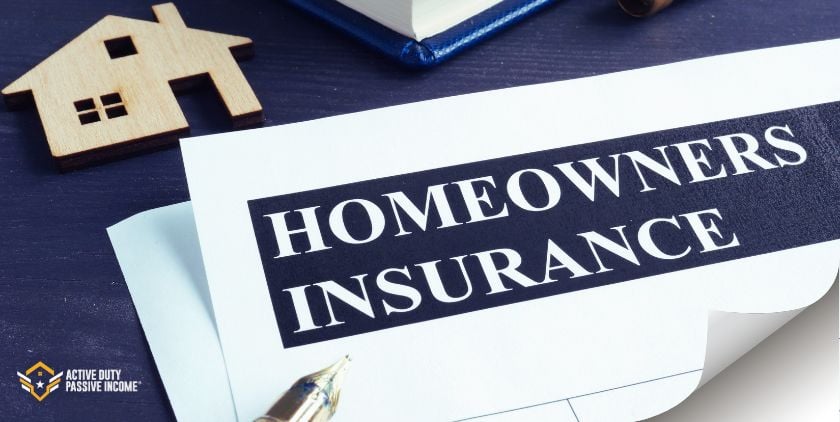When purchasing a home with a VA loan, understanding the homeowners insurance requirements is crucial. Homeowners insurance provides protection and financial security for your property. In this informative blog, we will explore VA homeowners insurance, whether it is required for VA loans, the basic coverage it provides, the impact of deployment on insurance, and valuable ADPI Pro Tips to help veterans save on homeowners insurance.
Homeowners insurance can save your investment and your financial freedom! I am going to give an example of my personal experience with utilizing homeowners insurance to help you understand why the rest of the information below is so important. Every step in the journey of shopping for a good policy can make a difference in your homeowner and investment journey!
As a new home owner excited to execute a VA Loan I got all of the inspections, and even brought in an engineer because the area I was buying in had known foundation issues throughout the community and city. So after several inspections the house got an A+ grade and was even annotated as a “better kept house than its peers” in one report. So fast forward to 3 years later I found myself in a battle worth $23K. That amount of money could have broken me if I was going to have to pay out of pocket.
Here’s what happened:I contacted the insurance company when a toilet was backing up and I had a plumber find rocks and sand in the line. The insurance company was hesitant to cover anything because they considered it a backed up toilet and once that was fixed it would be fine right? Now I take you back to the original part of the story where there were known foundation issues in this area.
Afraid it could be something more (no one was flushing rocks and sand down the toilet) I pressed the plumbing company to continue to search and write up every one of their actions. I continued to submit documentation and when the insurance company realized I was not going to go away they decided they would hire their own plumbing company to come out and conduct a pressure test. Guess what they found?
5 breaks to the main sewage line were found! Long story short, my entire foundation was dug out from underneath and the main plumbing line had to be replaced. One day I will document the entire story but what you need to gather from this is it is important to have insurance because you have to keep the house in good working order and instead of $23K I paid my deductible ($3K) and the work was covered, the dig, the materials, and the ruined front yard!
So now that I have talked about my experience and why homeowners insurance is important, let’s jump in and cover some information to help you better understand what it is and how you obtain the best situation for protecting your property.

What Is VA Homeowners Insurance?
VA Homeowners insurance is important to have and become educated about, therefore in an emergency your assets are covered! VA homeowners insurance is purchased the same way other homeowners insurance is and is also known as hazard insurance. It is a type of coverage that protects the structure of your home and your personal belongings from unexpected events which include structural damage, accidents, fire, natural disasters and more. It provides financial reimbursement for repairs or replacement of damaged property and helps safeguard your investment.
When it comes to homeowners insurance policies, it’s important to take a close look and examine them carefully. Now, I don’t mean to alarm you or raise any red flags, but let’s approach this in a calm and low-threat environment before you are in a state of panic after something has gone wrong and you need the coverage!
You see, homeowners insurance is like a safety net for your most valuable asset, your home. It provides coverage and protection against unexpected events that could potentially damage or destroy your property. But here’s the thing: not all insurance policies are created equal, and they don’t automatically cover everything you might assume they do.
By closely reviewing your homeowners insurance policy, you can ensure that you have all the coverage you need, tailored to your specific circumstances. It’s a way to confirm that your policy adequately protects you from potential risks that are relevant to your geographic location, property type, and personal circumstances.
For instance, let’s say you live in an area prone to natural disasters like earthquakes or floods. You’d want to make sure your policy includes coverage for these specific events, as they might not be automatically covered under a standard policy.
Similarly, take a close look at the limits and deductibles specified in your policy. Are they sufficient to cover the replacement or repair costs in case of a claim? You don’t want to be caught off guard by unexpected out-of-pocket expenses because your coverage limits were too low.
Another important aspect to consider is personal liability coverage. This protects you in case someone gets injured on your property and decides to sue you. It’s a good idea to review the limits of liability coverage and ensure they adequately protect your assets and financial well-being.
Now, I want to emphasize that this isn’t meant to instill fear or paranoia. It’s simply a prudent step to take as a responsible homeowner. By closely examining your homeowners insurance policy, you can make informed decisions, understand the extent of your coverage, and make any necessary adjustments to ensure you have the protection you need.
So, take a deep breath and approach your policy review with a calm mindset. Think of it as an opportunity to assess your coverage needs and make any necessary adjustments to ensure your home is adequately protected. Remember, knowledge is power, and by understanding your policy, you can confidently navigate the world of homeowners insurance and enjoy peace of mind knowing you’re well-covered.
Do VA Loans Require Homeowners Insurance Policies?
Yes, VA loans require homeowners insurance policies to be in place at the time of purchase. Lenders want to ensure that their investment is protected in case of unforeseen damage to the property. Homeowners insurance is a standard requirement for most mortgage loans, including VA loans. It helps safeguard the home as well as both the lender’s and the homeowner’s interests.
A homeowners insurance plan is a type of insurance policy designed to protect homeowners from potential financial losses or damages related to their property. It typically provides coverage for the physical structure of the home, personal belongings, and liability protection in case someone is injured on your property or if you cause damage to someone else’s property.
Here are some key components typically covered by a homeowners insurance plan:
- Dwelling Coverage: This covers the physical structure of your home, including the walls, roof, and foundation. It helps repair or rebuild your home if it’s damaged by covered perils, such as fire, windstorm, or vandalism.
- Personal Property Coverage: This protects your belongings, such as furniture, appliances, and clothing, against covered perils, both inside and outside your home. It’s important to review the policy to ensure your personal property is adequately covered.
- Liability Coverage: This provides financial protection if someone is injured on your property or if you accidentally damage someone else’s property. It can help cover legal expenses or medical bills if you’re found liable for the incident.
- Additional Living Expenses: If your home becomes uninhabitable due to a covered event, this coverage helps pay for temporary living arrangements, such as hotel stays or rental costs, while your home is being repaired.
Home Insurance Requirements for VA Loans
VA loan homeowners insurance requirements typically include coverage for the dwelling, liability protection, and personal property coverage at a minimum.
The best way to protect and understand your needs is to seek out the following information and use the resources available.
Insurance Agents: Contacting an insurance agent who specializes in homeowners insurance is a common approach. They can help assess your needs, provide policy options from different insurance companies, and assist you in choosing the right plan.
Insurance Companies: Many insurance companies offer homeowners insurance directly to consumers. You can visit their websites, request quotes, and explore policy details. Comparing multiple companies can help you find the best coverage and rates.
Online Insurance Marketplaces: There are online platforms that allow you to compare quotes from multiple insurance companies in one place. These marketplaces make it convenient to review different policy options and choose the one that suits your needs.
Banks or Mortgage Lenders: If you have a mortgage, your lender may require you to have homeowners insurance. They might have partnerships with insurance companies or provide recommendations for insurance providers.
Remember, when obtaining a homeowners insurance plan, it’s important to compare coverage options, policy terms, deductibles, and premiums. Consider your specific needs, property details, and any additional coverage you may require. Reading policy documents thoroughly and asking questions will ensure you understand what is covered and what is not.
By doing your due diligence and exploring different options, you can find a homeowners insurance plan that suits your needs, provides adequate coverage, and protects your home and belongings against unexpected events.

Homeowners Insurance Basic Coverage
Homeowners insurance, also known as hazard insurance or home insurance, is not directly required by the VA, but it is typically required by lenders as part of the loan agreement. The VA does have some requirements that relate to insurance, such as requiring a termite inspection in some states, but the specifics of homeowners insurance are generally left up to the lender.
That being said, the lender will typically require a policy that covers the cost of rebuilding the home in case of a total loss, which is usually the amount of the loan itself. Additionally, most lenders will also require that the policy includes coverage for personal liability in case someone is injured on the property.
Here are some types of coverage often required:
Dwelling coverage: This covers damage to the home itself.
Personal property coverage: This covers damage to or theft of personal belongings.
Liability coverage: This protects the homeowner if someone else is injured on the property.
Additional living expenses (ALE) or loss of use: This covers living expenses if you’re forced out of your home due to a disaster.
Lenders also generally require that borrowers include a clause that names the lender as the mortgagee on the policy. This gives the lender the right to receive the insurance payout directly if the home is damaged.
Remember that each lender can have slightly different requirements, so it’s important to discuss this with your lender when getting a VA loan. Also, homeowners insurance policies can vary greatly in their terms, exclusions, and limits, so make sure to understand your policy well.
Homeowners Insurance Payment
Homeowners insurance is typically paid annually or through monthly premiums. Many times this will be placed into an escrow account which is where the homeowner’s money will be collected for principal, interest, insurances and taxes which will be paid by the lender each year. The cost of insurance varies based on factors such as the value of the property, location, deductible amount, and additional coverage options. It is important to budget for homeowners insurance premiums as part of your homeownership expenses.
If you buy a property outright or you do creative financing such as an owner finance deal you typically will not have the conveniences of an escrow account so you will most likely have to contact an insurance agency to cover the property with an annual payment.
How Being Deployed Can Affect Homeowners Insurance for Your Property
Deployment can impact homeowners insurance in several ways. It is crucial to inform your insurance provider if you will be deployed for an extended period. Consider the following factors that may affect your coverage:
Occupancy Clause
Some homeowners insurance policies have an occupancy clause that may limit coverage if the property is left vacant for an extended period of time. It is important to understand the terms of your policy and notify your insurance provider accordingly of your circumstances in the event of a deployment.
War Zone Exemption
If you are deployed to a war zone, your homeowner’s insurance policy may have additional exclusions or limitations regarding coverage. It is important to discuss this with your insurance provider and explore specialized coverage options if needed.
ADPI Pro Tips
- Shop around: Compare quotes from multiple insurance providers to find the best coverage at a competitive price.
- Bundle policies: Consider bundling your homeowners insurance with other policies, such as auto insurance, to potentially qualify for discounts. Bundling with other insurances that you may have generally allows for greater discounts.
- Increase security: Installing security systems, smoke detectors, and deadbolt locks can qualify you for discounts on homeowners insurance premiums. Be sure to look into what items can qualify you for additional discounts.
- Maintain good credit: Maintaining a good credit score can positively impact your homeowners insurance rates. Make sure you pay your bills on time and keep your credit utilization low.
- Review coverage periodically: Regularly reassess your coverage needs to ensure you are not overinsured or underinsured. Adjust your policy as necessary to align with your current circumstances. Typically this is done annually as you are about to renew the policy










